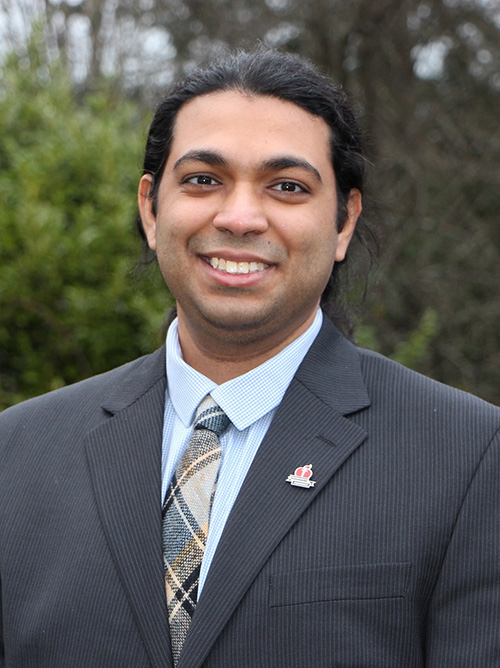Dr. Venkat Keshav Chivukula
Seminar Information

Increasing prevalence of cardiovascular diseases such as heart failure have led to growing dependence on medical devices such as left ventricular assist devices (LVAD) to maintain adequate circulation for a patient with a failing heart. However, hemodynamically-induced complications such as emboli formation and thrombosis can lead to devastating adverse events such as pump failure and stroke. Blood as a fluid is truly unique, comprising of red blood cells, white blood cells and platelets suspended in plasma. Thus, the diverse and complex behavior of blood as a particle-laden fluid operating under various spatio-temporal interdependencies presents a fascinating and challenging problem to analyze. It is crucial to elucidate the complex interplay between hemodynamic stimuli and biological response, especially in the setting of blood-contacting medical devices such as LVADs. Several surgical and anatomical features such as left ventricle size, shape, LVAD implantation configuration, native contractility, aortic root structure and LVAD operational parameters have a significant influence on hemodynamic performance and efficacy of LVAD therapy. In this seminar, I will discuss some of the approaches we use at various scales (micro and macro) to analyze hemodynamics and associated complications such as stroke risk. Specifically, I will describe our recent methodologies involving virtual surgery, surgical optimization and designing patient-specific device management strategies to optimize hemodynamic performance. Further, we will also discuss similar approaches that can be utilized to investigate hemodynamic optimization neurovascular therapy such as cerebral aneurysm treatment. Finally, we will discuss some of the approaches that can be utilized in the future, such as combining machine learning with hemodynamic quantification for patient-specific hemodynamic optimization towards improving patient outcomes.
I am an Assistant Professor in BME and the PI of the Multiscale Cardiovascular Fluids Laboratory at Florida Institute of Technology. The cardiovascular and neurovascular systems is fascinating to me, and forms the focal point of my research. I have a background in mechanical engineering, with a PhD in biomedical engineering. I obtained my BE in Mechanical Engineering from the University of Mumbai, India, MS in Mechanical Engineering from the University of Arizona and PhD in Biomedical Engineering from the University of Iowa. I was a post-doctoral researcher at the Oregon Health and Science University and the University of Washington, where I was awarded an American Heart Association (AHA) postdoctoral fellowship and the Young Investigator Fellowship by the American Society of Artificial Internal Organs (ASAIO) for my research on heart failure. I received the Outstanding Teaching Faculty Award in 2020 at the University of North Texas . At Florida Tech, I was recently awarded the AHA Career Development Award for combining hemodynamic analysis and machine learning approaches towards predictive surgical optimization for LVAD therapy. I love to teach and enjoy empowering students in the fantastically intriguing (and of course, complex!) realm of engineering. Additionally, I enjoy doing K-12 outreach by spreading the power of knowledge (especially in STEM fields) to the youth of today. Outside of research and teaching, I enjoy soccer, cars, food and spending time with my family.
Lab website: https://research.fit.edu/cardioflow/
Research and Professional website: https://cvkeshav.wixsite.com/research-teaching
